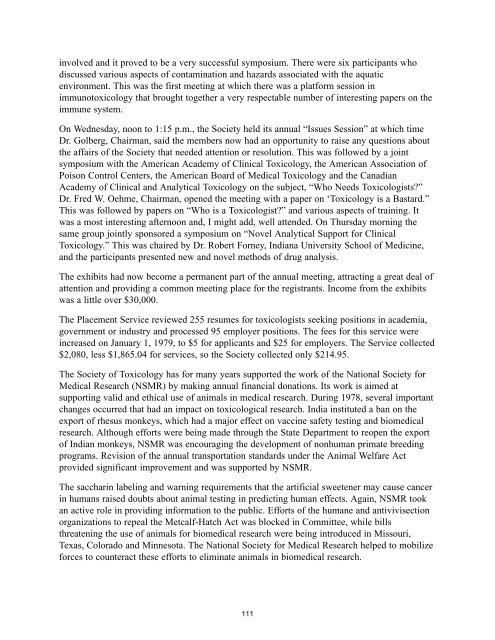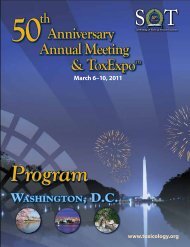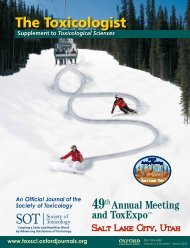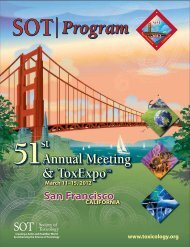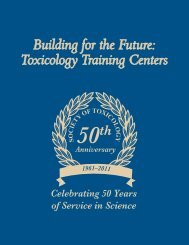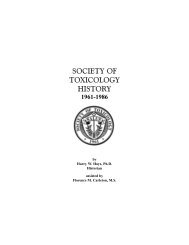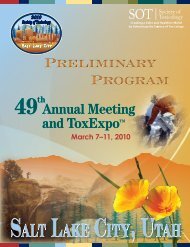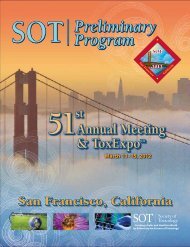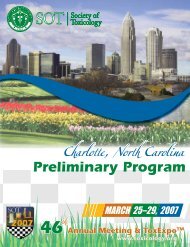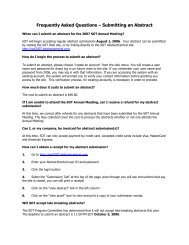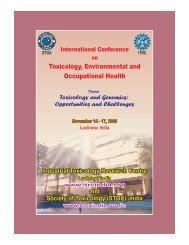SOCIETY O. TOXICOLOGY HISTORY - Society of Toxicology
SOCIETY O. TOXICOLOGY HISTORY - Society of Toxicology
SOCIETY O. TOXICOLOGY HISTORY - Society of Toxicology
You also want an ePaper? Increase the reach of your titles
YUMPU automatically turns print PDFs into web optimized ePapers that Google loves.
involved and it proved to be a very successful symposium. There were six participants who<br />
discussed various aspects <strong>of</strong> contamination and hazards associated with the aquatic<br />
environment. This was the first meeting at which there was a platform session in<br />
immunotoxicology that brought together a very respectable number <strong>of</strong> interesting papers on the<br />
immune system.<br />
On Wednesday, noon to 1:15 p.m., the <strong>Society</strong> held its annual “Issues Session” at which time<br />
Dr. Golberg, Chairman, said the members now had an opportunity to raise any questions about<br />
the affairs <strong>of</strong> the <strong>Society</strong> that needed attention or resolution. This was followed by a joint<br />
symposium with the American Academy <strong>of</strong> Clinical <strong>Toxicology</strong>, the American Association <strong>of</strong><br />
Poison Control Centers, the American Board <strong>of</strong> Medical <strong>Toxicology</strong> and the Canadian<br />
Academy <strong>of</strong> Clinical and Analytical <strong>Toxicology</strong> on the subject, “Who Needs Toxicologists?”<br />
Dr. Fred W. Oehme, Chairman, opened the meeting with a paper on ‘<strong>Toxicology</strong> is a Bastard.”<br />
This was followed by papers on “Who is a Toxicologist?” and various aspects <strong>of</strong> training. It<br />
was a most interesting afternoon and, I might add, well attended. On Thursday morning the<br />
same group jointly sponsored a symposium on “Novel Analytical Support for Clinical<br />
<strong>Toxicology</strong>.” This was chaired by Dr. Robert Forney, Indiana University School <strong>of</strong> Medicine,<br />
and the participants presented new and novel methods <strong>of</strong> drug analysis.<br />
The exhibits had now become a permanent part <strong>of</strong> the annual meeting, attracting a great deal <strong>of</strong><br />
attention and providing a common meeting place for the registrants. Income from the exhibits<br />
was a little over $30,000.<br />
The Placement Service reviewed 255 resumes for toxicologists seeking positions in academia,<br />
government or industry and processed 95 employer positions. The fees for this service were<br />
increased on January 1, 1979, to $5 for applicants and $25 for employers. The Service collected<br />
$2,080, less $1,865.04 for services, so the <strong>Society</strong> collected only $214.95.<br />
The <strong>Society</strong> <strong>of</strong> <strong>Toxicology</strong> has for many years supported the work <strong>of</strong> the National <strong>Society</strong> for<br />
Medical Research (NSMR) by making annual financial donations. Its work is aimed at<br />
supporting valid and ethical use <strong>of</strong> animals in medical research. During 1978, several important<br />
changes occurred that had an impact on toxicological research. India instituted a ban on the<br />
export <strong>of</strong> rhesus monkeys, which had a major effect on vaccine safety testing and biomedical<br />
research. Although efforts were being made through the State Department to reopen the export<br />
<strong>of</strong> Indian monkeys, NSMR was encouraging the development <strong>of</strong> nonhuman primate breeding<br />
programs. Revision <strong>of</strong> the annual transportation standards under the Animal Welfare Act<br />
provided significant improvement and was supported by NSMR.<br />
The saccharin labeling and warning requirements that the artificial sweetener may cause cancer<br />
in humans raised doubts about animal testing in predicting human effects. Again, NSMR took<br />
an active role in providing information to the public. Efforts <strong>of</strong> the humane and antivivisection<br />
organizations to repeal the Metcalf-Hatch Act was blocked in Committee, while bills<br />
threatening the use <strong>of</strong> animals for biomedical research were being introduced in Missouri,<br />
Texas, Colorado and Minnesota. The National <strong>Society</strong> for Medical Research helped to mobilize<br />
forces to counteract these efforts to eliminate animals in biomedical research.<br />
111


